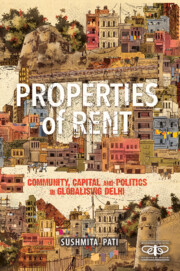Book contents
- Frontmatter
- Contents
- List of Maps and Figures
- Acknowledgements
- List of Permissions
- List of Abbreviations
- Units of Measurement
- Maps
- Introduction
- 1 Creating Values of Land: Law, Records and Kabza
- 2 From Buying Land, Owning Taxis to Becoming Landlords: The Changing Economic Landscape of Villages
- 3 Villages of the City: Ordering Spaces and Aspirations in Neoliberal Times
- 4 In the Shadows of the State: Community as a Mode of Political and Economic Organisation
- 5 Culture, Gender and Belongingness? City and the Violence of Rent
- 6 The Fringes of the Cartel: How the Marginalised Become Landlords
- 7 The Allure of Politics: The Candidates, the Cadre and the Euphoria of Elections
- Epilogue
- Glossary
- Bibliography
- Index
5 - Culture, Gender and Belongingness? City and the Violence of Rent
Published online by Cambridge University Press: 31 March 2022
- Frontmatter
- Contents
- List of Maps and Figures
- Acknowledgements
- List of Permissions
- List of Abbreviations
- Units of Measurement
- Maps
- Introduction
- 1 Creating Values of Land: Law, Records and Kabza
- 2 From Buying Land, Owning Taxis to Becoming Landlords: The Changing Economic Landscape of Villages
- 3 Villages of the City: Ordering Spaces and Aspirations in Neoliberal Times
- 4 In the Shadows of the State: Community as a Mode of Political and Economic Organisation
- 5 Culture, Gender and Belongingness? City and the Violence of Rent
- 6 The Fringes of the Cartel: How the Marginalised Become Landlords
- 7 The Allure of Politics: The Candidates, the Cadre and the Euphoria of Elections
- Epilogue
- Glossary
- Bibliography
- Index
Summary
Kaun hain hum? Humara kya pata hai? Kya parichay hai hamara? Hum woh kisaan hain jinhone Dilli ki pragati ke liye sabse pehle apni bhoomi di.
—Youth Brigade, MunirkaWe have to interpret the war that is going on beneath peace; peace itself is coded war. We are therefore at war with one another; a battlefront runs through the whole society, continuously and permanently, and it is this battlefront that puts us all on one side or the other. There is no such thing as a neutral subject. We are all inevitably someone's adversary.
—Michel Foucault, Society Must be DefendedBeenu was an affable man, and rather quick witted. Since he had seen his father run a brick kiln, and dabbled in the transport business, real estate and local financing himself, I asked him to tell me what the experience of seeing things changing so drastically right before his eyes had been like. He responded with a smile,
Aapne woh kauue ki kahani suni hai? Ek kauua tha jisko mor banna tha. Toh woh apne upar kuchh mor ke pankkh laga kar moron ke saath rehne chala gaya. Moron ko pata chal gaya ki who kauua hai toh use nikaal diya. Woh waapas kauuon ke beech aaya toh use kauuon ne nikaal diya ki woh kauuon ke saath rehna nahi chahta. Hum bilkul us kauue ki tarah hain.’
The contradiction that Beenu had drawn was not merely a spatial one. There is a world of difference between the city and the village. People of South Delhi belong to the upper middle class and might even be considered the city's elite. Businessmen to government officials to members of the cultural and intellectual elite inhabit the many localities of South Delhi—all built on the agricultural lands of these villages. The villagers, however, may have money, but they do not embody the cultural capital that defines South Delhi. Both the city and the village have become cosmopolitan spaces, with aspirations that are quite ‘urban’, with inhabitants moving in and out of them seamlessly. This blurs the conceptual borders between urban and rural without erasing them, while also producing differences and hierarchies spatially. It also messes up identities. Proud Jat men find themselves derided in an urbanised world.
- Type
- Chapter
- Information
- Properties of RentCommunity, Capital and Politics in Globalising Delhi, pp. 144 - 173Publisher: Cambridge University PressPrint publication year: 2022

